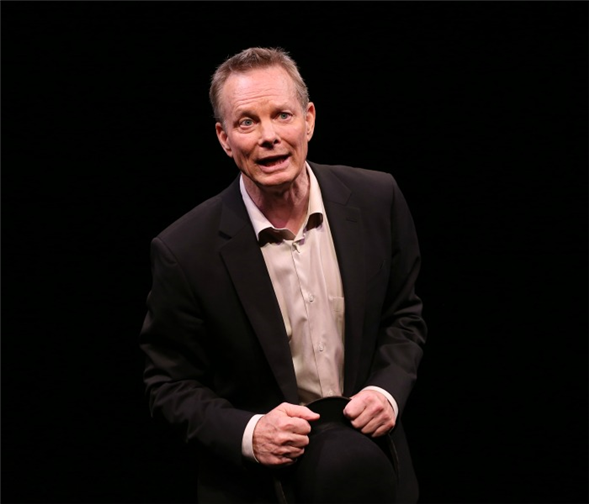Translate Page

The Tony winner mounts a singular tribute to the legendary writer at Irish Rep
---
Bill Irwin is not a scholar. He is not a biographer. He is a clown. Whether you know him as Mr. Noodle on Sesame Street, or for playing fools in Shakespeare, or from his neo-vaudeville romps Fool Moon and Old Hats, his Ringling Brothers and Barnum & Bailey Clown College training is usually in evidence. Even his Tony-winning turn as George in the 2005 Broadway revival of Who's Afraid of Virginia Woolf? had a touch of buffoonery. So it's no surprise he's long been captivated by Samuel Beckett, whose absurdist writings are populated by tragicomic clowns.
Irwin has tackled two iconic Beckett roles on New York stages before, both in Waiting for Godot. He was the enslaved Lucky in the famed 1988 Lincoln Center revival starring Robin Williams and Steve Martin, and graduated to lead Vladimir opposite Nathan Lane's Estragon in Roundabout's 2009 production. In between, he won an Obie for performing some of Beckett's prose pieces in the solo show Texts for Nothing Off-Broadway.
There are bits from both of those works, plus sequences from Beckett's novel Watt, in On Beckett at Irish Repertory Theatre, Irwin's highly original homage to the Nobel Laureate. It's an ode to a voice Irwin can't get out of his head, so he lets his dexterous body do the dissertating.
"The gift of getting to Beckett came from Joe Chaikin," he says about the late director, who collaborated with Irwin on the original incarnation of Texts for Nothing at the Public Theater in 1992. Although Irwin had already done Godot at that point, this deep dive into Beckett was revelatory. "It's dense stuff," he says. "For me, it sounds like my grandfather, and the way my uncle would impersonate my grandfather, and my mother's imitation of him. That's how I find the flow."
Over the years, Irwin continued to work on Texts for Nothing, even enduring intense negotiations with Beckett's estate about his approach before reimagining it at Classic Stage Company in 2000. "It was the best thing that ever happened to me," he says. "They were right. I hadn't done primary research. I'd taken Joe's take. So I immersed myself in the prose. I remember, a neighbor of mine asked if he could borrow my copy of the text. Two hours later, the book was back in my mailbox. He said, 'Bill, I can't read this. It's just a wall of words.' The prose stuff is a wall of words until you find in it a conversation, a little dialogue between characters within one head. It takes a while."
Happily, Irwin has done the heavy lifting for audiences with On Beckett, in which he contextualizes the writer's work and then makes it come alive on stage. Standing on the shoulders of silent film stars like Buster Keaton and Charlie Chaplin, Irwin conjures some of Beckett's signature characters. He plays with a bowler hat, baggy pants and oversize shoes, but he also paints the writer's tramps with painful sincerity.
"It's fun for an aficionado, sure, but it's also an entrée for people who don't really know this writer," he says. "The most useful approach to performing the show is to ask myself: 'What if I was seeing this for the first time?' After all, that's my job."
Initially, Irwin envisioned On Beckett as more tell and less show, equal parts Q&A and performance. "I thought it would be an hour at most," he recalls. "But even at 90 minutes I wasn't hitting nearly as much of the material as I do now!"
The oldest of three siblings, Irwin recalls doing "anything to keep my younger siblings engaged." He says there's a similar dynamic between him and the audience as he clowns his way through On Beckett. "The main thing I've learned is to talk less," he says. "I'm here to give some quick reflections on what it's been like to live with this voice for as long as I have, and then get on to the next passage."
---
Ned Moore is a dramaturg and theatre writer. Follow him at @nedmooretheatre. Follow TDF at @TDFNYC.
Top image: Bill Irwin in On Beckett. Photos by Carol Rosegg.
TDF Members: Go here to browse our latest discounts for dance, theatre and concerts.